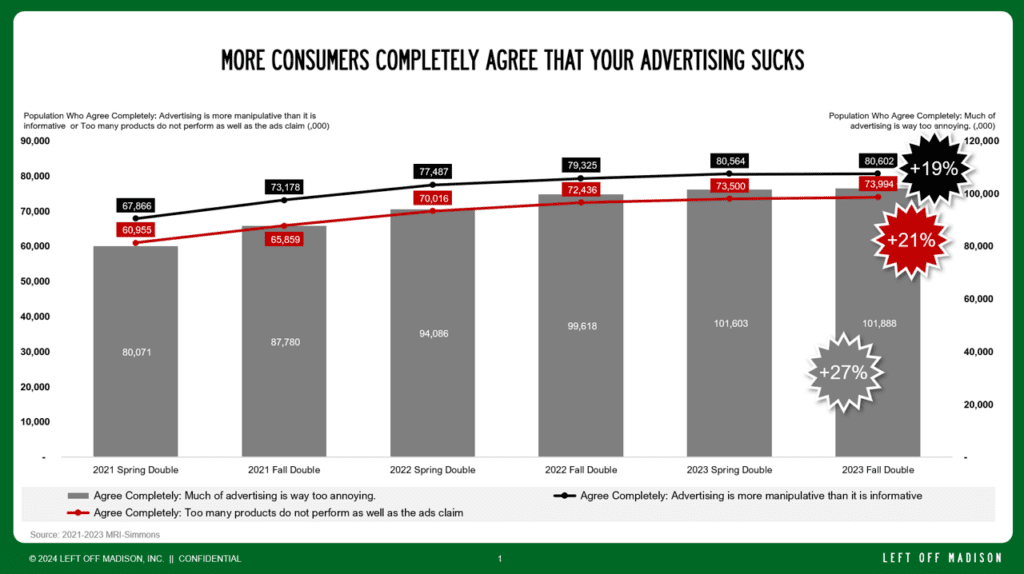More Consumers Agree That Your Advertising Likely Sucks

There is trouble in advertising land. Consumers are increasingly annoyed with advertising. This has been created by the marketers and their ad agencies. But our question is who is responsible and accountable?
Marketers spend billions of dollars each year in the U.S. in advertising media (source: eMarketer). These marketers– that includes your favorite maker of soft drink, beer, mobile phones, and automobile– spent a fraction of that to invest into the ad agencies, people, process, and tools to get better at building better advertising messages as well as targeting better prospects. Why? So, that ad messages are more relevant– right person, right place, right time– and, presumably, more warmly welcomed. The net result should be high quality target engagement leads to stronger return on investment.
However, there is a fundamental issue with advertising. A lot of people find advertising annoying, manipulative, and falsely representing what the products or services can do for them.
No, it isn’t some fringe group of 2 million or 10 million people. What we are seeing is that there are 101,888,000 adults ages 18-plus who agree completely to the statement “Much of advertising is way too annoying.” See the grey bars in the chart below (source: MRI-Simmons). That’s nearly 40% of all adults in the U.S. ages 18-plus. What is more frightening is that headcount is up 27% from just a little more than two years ago. OUCH! The good news is that it appears that the trend is beginning to flatten.

Yes, this is a symptom of bad messaging and bad creative which is commonly a byproduct of a weak brand strategy and an emotionless, forgettable ad message. A favorite David Ogilvy quote is “You cannot bore people into buying your product; you can only interest them into buying it.” Marketers and agencies need to take stock in their work, but it starts with a smart brief that, honestly, might take some time to noodle over. Because another favorite David Ogilvy quote of ours is “Big ideas are usually simple ideas.” The issue is, being simple is incredibly difficult and it can take time to cut through the fog to get simple. And if too many people are involved, or those with little hardcore advertising experience but lots of sway, they will gum-up the ad with things that makes the ad less simple.
Also, advertising annoyance can be a function of a high ad frequency– customer prospects seeing the ad message too many times in a short period of time. Or, it’s bad targeting of audiences whether incorrect ad placement or they aren’t your customer type. Said another way, those millions of dollars spent to get better at targeting are not better for many. The point is, marketers and their agencies need to do better. A client’s ROI will decline and and their push for accountability from agencies– whether external or internal agencies– will grow. Additionally, ad blocking will grow exponentially.
The laughable part are those new-fangled advertising “attention meters”– tools to determine whether customer prospects are actually paying attention to your ads– can be thrown in the diaper bin.
In the same chart, we see other complementary metrics such as the 80,602,000 people who agree completely to the statement “Advertising is more manipulative than it is informative.” This is a jump of 19-percent over the two-plus years. Yes, it sounds like a byproduct of political advertising, but what is driving this consumer perception requires additional qualitative research. Truth is, the product or service matters and the art of persuasion is as challenging as writing a strong brief.
Finally, we see that 73,994,000 adults ages 18-plus agree completely with the statement “Too many products do not perform as well as the ads claim” which has jumped 21-percent in the past 2-plus years. There can be so many factors involved with this, including effects of shrinkflation to lower quality manufacturing or another.
There is trouble in advertising land. It has been created by the marketers and their ad agencies. But our question is who is responsible and accountable? We say that the agencies are responsible for laying down a clear point-of-view in writing to the client, but at the end of the day, the buck stops with the marketers. It’s their budget. It’s their brand or business. It’s their decision.
Back in the day, we had an advertising client. He was a legend who created iconic ad campaigns. His point of view was to focus on landing the right brief and empower the ad agency to drive the creative and media engines. He would buy it, if the agency truly believed in it. The client simply gave the ad agency the rope to hang themselves or to swing from. The end result is that all of the best creative people clamored to work on his business because he would produce it. So much of it won awards. It is a rare instance when we had creative people leaning-in to want to know the sales data.
Not enough marketers place enough partnership, accountability and trust into their agencies.
On a closing note, in our unscientific observation there seems to be a lot less advertising industry creative people working at ad agencies these days. To summarize the symptoms, there now seems to be plethora of creative agency start-ups and a glut of fantastic creative talent available now for freelancing.
MORE IDEAS



